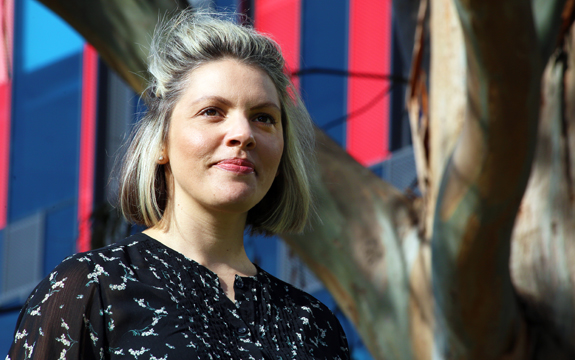Because of her, we can – moving from symbol to meaning through reconciliation

In Summary
- Indigenous Strategy Manager Angela Burt is one of many Indigenous women leading the way towards reconciliation at Swinburne
- Swinburne supports the NAIDOC Week theme celebrating Indigenous women in the community – Because of her, we can
- Swinburne’s Moondani Toombadool Centre is committed to reconciliation as part of core business practices and decision-making
The journey towards reconciliation is long and personal. Taking the time – as an individual, a community, or an organisation – is key to understanding and making meaningful connections. That search for meaning is what drives Swinburne’s Indigenous Strategy Manager Angela Burt.
Through Swinburne’s Elevate Reconciliation Action Plan (RAP) and new Moondani Toombadool Centre, Mrs Burt works to create real opportunities for staff, students and the community to move past the symbolism of reconciliation and into real change.
“Our RAP brought about a significant change to our culture of reconciliation. It’s been a strong statement about what Swinburne values for our students and that has a domino effect,” says Mrs Burt.
“We’ve moved well past the symbolism to the meaningful – which has come from our shared sense of responsibility.”
Moondani Toombadool means 'embracing teaching and learning’ in the Woiwurrung language. Swinburne’s Indigenous Strategy and Indigenous Engagement teams joined forces through the centre in April to instigate and support cultural change. And their work resonates across the university.
Most recently, Ms Burt introduced a self-nominating RAP supporters program, empowering staff to develop skills to help propel and champion reconciliation.
“I’m very proud of this program. We asked people to share their experiences and passion for belonging, and their responses were inspiring. We’ve been able to learn about each other and share our stories, which is at the heart of reconciliation,” says Mrs Burt.
Because of her, we can
Angela Burt may work behind the scenes bringing Swinburne’s RAP to life but she’s not one to limit herself to a supporting role.
An experienced educator and researcher in both the primary and tertiary sectors, Mrs Burt currently drives Indigenous Strategy at Swinburne, lectures in Indigenous education and is completing her PhD in Indigenous knowledge within mainstream curriculum.
Alongside the work led by Professor Andrew Gunstone and the new Moondani Toombadool Centre team, Mrs Burt was instrumental in bringing Swinburne’s first RAP into being and then helping it achieve ‘Elevate’ status.
“It’s empowering: Indigenous culture is complex and challenging,” says Mrs Burt.
“For anyone working in the reconciliation space connection and consultation are key.
“You need to appreciate who you are, as an individual and as an organisation, to own your connection and story first. Some of the best RAPs are self-reflective, they own their own mistakes, personally and professionally.”
As a seventh-generation Palawa woman from Cape Barren Island in Bass Strait, Mrs Burt took time to connect with her own story and understand her many roles in the community.
“My doctorate research builds on the work of my Great Aunty Dr Molly Mallet in the field of education. She was on the Tasmanian Aboriginal Education Advisory Council and started the first Indigenous childcare centre in Tasmania.
Self-reflection is integral to the consultation process for building a RAP. Focusing inward then reaching out helps people and organisations appreciate their place and connection to community and to reconciliation.
“After becoming a mother, I embraced my role as a cultural guide. My work with Swinburne and my studies have helped with this.
“I’m very aware of the privilege of this position – to do work that benefits my family, the community and the organisation. I am very grateful for that and have so much more to learn and to share.”
“We appreciate it’s a long journey and our elevated RAP has given traction for meaningful change. It is challenging but change, even small change, sustains us,” says Mrs Burt.
Connecting community
Swinburne has more than 100 Aboriginal and Torres Strait Islander students on campus, and more than 300 studying online, as a well as a growing group of staff members across the university. This growth also brings new challenges as the team works to create and maintain a sense of connection to country, to each other and to the broader community.
“It’s a new landscape for us, particularly in the online environment,” says Mrs Burt.
“This next stage is about creating spaces – physically, psychologically and digitally – that will connect and improve our presence and meet the needs of a diverse and growing group of people.”
Already forged through Swinburne’s Elevate RAP are strong partnerships with Richmond Football Club and industry groups and ongoing deep consultation and relationship-building with Elders and community groups. Culturally accessible support programs, campus-wide competency training and an upcoming extended program of Indigenous studies give weight to the university’s commitment.
“But it’s our students who really reaffirm the work that we do,” says Mrs Burt.
As well as scholarships, Swinburne has linked students to internships, awards and opportunities to work and connect with communities and each other through social groups, advocacy, career advice and tutorial assistance.
These opportunities will continue to grow, alongside Swinburne’s Indigenous community, with Angela Burt and many others like her, at the helm.

